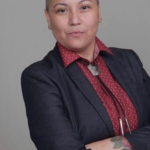
Working With Native American Indians And Historical Trauma
Information
Date & Time
-
-
Location
-
Southern Hemisphere IV
1500 Epcot Resorts Boulevard
Lake Buena Vista, FL 32830
Learning Objectives
Participants will be able to:
-
Identify 3-4 effects of intergenerational and historical trauma within Native American Communities.
-
Summarize the need for clinical awareness when treating individuals within Native Communities, due to intergenerational and historical trauma.
-
Explain 1-2 techniques to promote healing from generational and/or experienced trauma.
-
Explain 1-2 techniques for promoting wellness from generational and/or experienced trauma.
Description
This session delves into the need for Clinicians and Peers understanding of Intergenerational and Historical trauma within Turtle Island (USA). Where does the healing start and when did the trauma begin? Informative information to help Clinicians & Peers to navigate working with the Native American Indians. This session dives into the elements of trauma that affects the Native American Community, Colonization, forced displacement, Trail of tears, treaties being broken, and multi layers of a wounded communities due to the Indian Removal Act in the 1800 hundreds. We will examine ways to promote wellness of healing for Native Communities “The Native Way” and become more informed of how History and Generational Trauma played a HUGE role in how the Native American Indian have been affected and our future 7 generations.
Target Audience
- Counselor
- Marriage & Family Therapist
- Nurses
- Physicians
- Psychologist
- Social Worker
- Substance Use Disorder Professionals
Presenters

Kristina Padilla is a leader with the California Consortium of Addiction Programs and Professionals (CCAPP), where she serves as the Vice President of Education overseeing CCAPP’s Education Department. She also is the Vice President of Strategic Development for the organization wherein she travels throughout California and the nation bringing addiction focused businesses together to promote the profession, increase access to services and improve the quality of AOD service provision through education, business development, and investment in quality programming.
Mx. Padilla has a Bachelor’s of Science in Criminal Justice Administration and a Master’s Degree in Counseling Psychology with an emphasis on Marriage and Family therapy. Mx. Padilla is a Licensed Advanced Alcohol and Drug Abuse Counselor (LAADC), and an International Certified Advanced Alcohol and Drug Abuse Counselor (ICAADC). She is on the Board of Directors of the National Association of Lesbian, Gay, Bisexual, Transgender Addiction Professionals and their Allies (NALGAP) where she is the Vice President and is the California representative. Mx. Padilla is the Chief Academic Officer for the CCAPP Academy at CCAPP.
Financially Sponsored By
- The Global Exchange Conference - Exchange Events